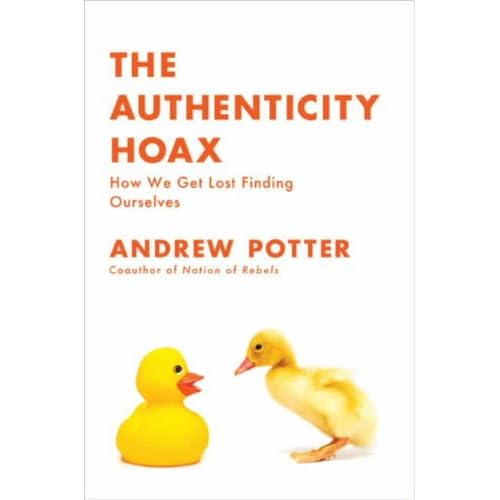The pub itself -- Abner's (the city is named after Abner Norman, a railroad engineer) -- is great. Good selection of beers at reasonable costs: for instance, they had Smithwick's and Harp as $3 specials. Plus, the sweet potato fries are heavenly. It's a great addition to the Norman weekend rotation.

But talking about books, the book I'm reading now is
"The Authenticity Hoax" by Andrew Potter, a Ph.D philosopher
(his Ph.D is in really in philosophy: his insurance company is not giving him any discounts). This is one of the books you relish as you read because the arguments are so striking. A couple of examples:
- On science and religion, he remarks that scientific discoveries alone are not enough to kick us out of the enchanted garden [referring to a world where religion gives us just-so stories to explain the universe] and that religion will play a role in people's lives as long as people accept the idea that religion and science have non-overlapping magisteria. So far, a standard argument. And then, he says the kind of thing that brings you up short because it's so pithy and so true: "For true disenchantment to occur, the scientific method of inquiry must be accepted as the only legitimate form of explanation".
- On what constitutes a modern sensibility: For Socrates, "self-discovery" just meant coming to terms with where you fitted in the great scheme of things, i.e. "know thyself" really just meant "know thy place". He continues: "The work of Jane Austen is so important precisely because it marks the transition from that world to a more modern sensibility -- most of her stories hinge on her characters' nascent individualism straining against the given roles of the old social order." A few pages later, he rounds off the topic: "No statement of how the world is can, by itself, validate any conclusion about what ought to be the case. We are no longer entitled, for example, to the argument that just because some groups are slaves, slavery is their natural and therefore justified condition".
His neat, well-written arguments advance an argument about what authenticity means and why it's a hoax. The crux of his argument is that the idea of authenticity has fallen victim to what, in philosophy, is called the "Hume's guillotone". We have imbued so much aura around the vague term "authenticity" (does it mean genuine? real? not false?) that we fall into the trap of drawing moral conclusions based merely on the thing being described as authentic. After all, why should the "genuine" article be better than something which has been polished, improved? Is an English-style pub in Norman, OK inauthentic and therefore necessarily snooty and bad? How about holding a book club where no books are discussed? This was interesting reading for me, because I committed this exact logical fallacy just one blog post ago -- after all, why should Dalip Singh Saund (whom I implicitly held up as an authentic Indian-American politician) be therefore morally better than Bobby Jindal or Nikki Haley (inauthentic politicians who probably converted to Christianity only so that they could run for election in very conservative states)?
Potter then pivots to a discussion of how the idea of authenticity shoves under the carpet much that was unfair and brutal in pre-modern societies and that the quest of left-wing hippies everywhere to "discover themselves", go on eco tours and fetish everything organic or natural or heirloom actually endangers the earth and rejects the benefits of market-driven, specialized economies. It is at this point that Potter's arguments start to sound over-wrought -- the Buddha promulgated a code of living in a far simpler and lucid way: "Moderation in all things," he said.
That said, "The Authenticity Hoax" is one of those books you should read, not because the overarching argument is novel, but because the minor discussions are so enthralling. It's like taking an eco-vacation, not because the destination is particularly interesting but because the scenery along the trip is awesome.
Your author says:
ReplyDelete"For true disenchantment to occur, the scientific method of inquiry must be accepted as the only legitimate form of explanation"
I don't agree that the scientific method is the only legitimate form of explanation. Anyone is free to adopt any form of "explanation" they wish - but - if you want a rational explanation for processes in the physical world, then science is indeed the only legitimate form.